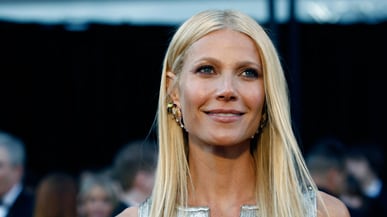She’s learned how to sing and play guitar. She’s gotten down with the cast of Glee. She’s appeared onstage with a Pug Muppet and Cee-Lo, dressed as a chicken. And now, she has a new cookbook, dedicated to her late father Bruce Paltrow, called My Father’s Daughter. But it seems like no matter what she does, Gwyneth Paltrow is the Rodney Dangerfield of upper-crust, blue-blood, blond Hollywood actresses: She can’t get no respect.

With every new dabbling achievement, she digs herself further and further down the rabbit hole of Internet scorn. If another star, say Sandra Bullock, were to abandon her main career and take up cooking, blogging, and singing, she might be admired for expanding her horizons and for trying new things. But Gwyneth Paltrow is mercilessly mocked just about every time she opens her mouth or does anything at all. Why does she inspire such derision? And can she ever win the public and media over?
“I think that people have this sense—whether it be accurate or not—that she is really into herself and comes across as holier than thou,” said blogger Perez Hilton, who is a fan. “A lot of that can be attributed to the fact that she lives in London, has said some not-so-great things about the U.S. before, and does come from a privileged background. Steven Spielberg is her godfather. People might think she’s had everything handed to her.”
So, of course we love to hate her. She’s, as New York magazine’s Jessica Pressler called her, the eternal head cheerleader of life. Picture-perfect, achieving it all, but altogether too smug about that fact.
When did Gwyneth go from America’s Princess to America’s Ice Queen? Perhaps it was sometime after the daughter of the fine theatrical actress Blythe Danner won the Best Actress Oscar for Shakespeare in Love in 1999, aiming for Grace Kelly but instead coming off like a pink, trembling cupcake. Her Oscar speech was a notoriously overlong, over-earnest, tear-filled, three-minute meltdown.
With every new dabbling achievement, she digs herself further and further down the rabbit hole of Internet scorn.
• Ramin Setoodeh: Gwyneth Paltrow Won’t Stop Singing • Bryan Curtis: The Rise of the Country Carpetbagger Since then, she’s strived to be all things to all people: the cook, the singer, the actress, the high-fashion collector/sometime model, the lifestyle guru. But even her current appearance, meant to spotlight her Jewish side, on Who Do You Think You Are? came with a built-in punchline: It turns out her ancestors were masters of Kabbalah, an ancient religion once unknown to the masses, but which is now, thanks to her ex-best friend Madonna, the second most mocked celebrity religion, after Scientology.
Attempts to shake off her rigid persona are not working, in the media, at least. “Gwyneth Paltrow is not uptight,” reads one recent headline. Ouch.
It’s like an image makeover gone awry.
Paltrow’s latest foray, the new cookbook, written with Mario Batali, is not doing much to overhaul the perception of the Oscar winner from frosty cold to warm ’n’ fuzzy, or from a spoiled, name-dropping celebrity ( Leo DiCaprio lectured her about meat-eating! Jamie Oliver gave her a cooking lesson! Her favorite vegetarian friend is Stella McCartney!) to regular working mom with preternaturally good taste.
The fact that she is the neverending target of jokes is odd, because she’s doing exactly what Gayl Murphy, a media trainer who’s worked with actors, producers, rock stars, and directors to overhaul their public images, says she advises people to do: She’s trying to be relatable. A celebrity like Paltrow should “create some commonality between herself and her audience without selling herself down the river. Something that is authentic to her, that is authentic to somebody else.”
But that authenticity—or lack of it—is part of Paltrow’s problem. After all, how much can a former macrobiotic, raw-foodist really know about cooking? Paltrow seems to know that we distrust her: She opens the book: “Why? You may ask.” But the answer isn’t really sufficient. (She loved eating food with her daddy.)
Why don’t we trust her the same way we trust that other WASPy blonde, Martha Stewart, who—Perez Hilton points out—is clearly her beacon? Because before she was an empire, Stewart was a self-taught cook, a master caterer who became a food writer for many magazines, and who over the years built a following big enough that she could sell a book filled with extravagant, intricate recipes that would dazzle the most jaded Connecticut socialite.
The difference between Stewart’s first book, Entertaining, and Paltrow’s latest, is that the first featured recipes for the very skilled—homemade pate on apple slices for 80 people; and the latter is that of a talented (and self-admitted) dabbler cooking for the family. Though Paltrow’s book is less intimidating as a cookbook, we don’t perceive her to be an authentic home chef and entertainer. While we still believe that Martha would not deign to have anyone else prepare the meals at her house parties, we still think about Gwyneth: She must have "people" doing it for her, right?
Paltrow has torn at least one page from the Stewart playbook by teaming up with Cee-Lo, engaging a crossover audience that most wouldn’t have anticipated. She got a cool-by-association lift the same way that Martha does when she pairs up with Snoop Dogg. But Martha seems to know something that Gwyneth does not: She is not just like us; she is rich and blond, and fancy. Stewart knows that she cannot pretend to be middle-class; she knows it would be disingenuous and patronizing to do so, and she knows it’s funny when she talks “fo’ shizzle” with Snoop.
Murphy says when she has celebrity clients who are trying to change how they are perceived, she has them consider: “How do they paint me differently than I am? And who is the end user of this?”
That raises the question—is Paltrow writing this book for her rich and famous friends; or is she hoping that the people reading her book consist of true middle-class moms? She seems to try to have it both ways: There are cozy stories about open-faced grilled cheese sandwiches (you mean, Croque Monsieur?) and Campbell’s tomato soup, drawing on a history of cooking with her beloved father, the late Bruce Paltrow, for inspiration. But even in a simple recounting of how she dealt with her father’s cancer is exasperating; she lists it as the reason she became a macrobiotic diet practitioner. Forehead slap.
The food itself looks tasty, fresh, and filling. She’s even started eating chicken (OK, it’s organic, local, hand-plucked, lovingly named —sorry, that was a Portlandia episode—chicken.). Most of the recipes are not overwrought combinations of flavors with 200 ingredients. But, who exactly can afford to make duck and rosemary burgers with plum ketchup?
Maybe, says Hilton, the solution for Paltrow to come down to earth is as simple as joining Twitter. “That would help to make her more normal and really relate to her fans. Like, who are her fans?” he said. “That’s the question.”
The haters might be surprised to know that people like her, they really like her.
Henry Schafer, executive vice president of The Q Scores Company, which tracks the likeability and recognition level of brands and celebrities, says that with a 21 positive Q score, Paltrow’s likeability rating has never been higher.
“She’s been hovering in mid-teens during this decade since her Academy Award, and now is the first time she’s attained this kind of level, and the biggest factor appears to be Glee.” (Note to all image-beleaguered celebrities: Get booked on Glee, stat.)
Schafer says the average performer rates a 15 positive Q rating. However, Sandra Bullock’s Q rating of 51 is superhuman and dwarfs second-ranked actress Julia Roberts’ 36 Q score.
With adults, Paltrow has a 90 percent recognition rate (meaning that almost everyone knows who she is); her biggest fans span all economic backgrounds—men aged 18 to 54; and women 18 to 34, and 50 and over, rate her positively. She’s gotten an uptick in support in the South, where she plays the strongest: “That could be a function of her country singing,” he said.
Schafer said her negative press didn’t result in a negative Q score, which often happens for more polarizing figures, like Madonna or Whoopi Goldberg. “I don’t know what the critics are saying,” he said about Paltrow. “We don’t get involved with that.”
Perhaps part of the critics’ problem with Paltrow is that her excursions into singing, cooking, and lifestyle advice seem like just that, excursions. It’s true that Paltrow has veered far away from the reason she became famous—and respected—in the first place: dramatic acting. (We remember her doing it once, and thought she was quite good.)
“People want to keep you in a box,” said Murphy. “Elvis was the biggest star when he started making movies and they would never let him make a good movie. They just wanted him to be Elvis and wiggle.”
Tricia Romano is an award-winning writer who has written about pop culture, style, and celebrity for the New York Times, the Village Voice, Spin, and Radar magazine. She won Best Feature at the Newswomen’s Club of New York Front Page Award for her Village Voice cover story, about sober DJs and promoters in the nightlife industry, " The Sober Bunch."




